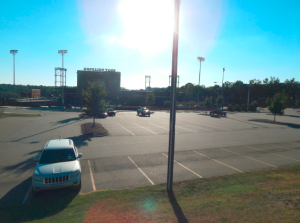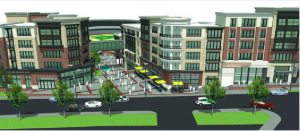Approved Ballpark Plans Include First Downtown Grocery Store
A developer is poised to open the first grocery store downtown as part of a $53 million investment in the area surrounding BB&T Ballpark following a 7 to 1 vote by the Winston-Salem City Council Monday, Sept. 21.
For Northwest Ward city councilman Jeff MacIntosh, the opening of a grocery store downtown means much more than just any other commercial expansion.
“A grocery store has been the Holy Grail,” MacIntosh said during the city council meeting. “This is a big win. People have been asking for it for thirty years.”
Brand Properties Real Estate Investment Group received the support of the City Council this Tuesday for its plans to develop the space and call it Brookstown District. If the project receives financial help from the county, the city will enter into a public-private partnership, with construction beginning in 2016 and the completion of the first phase happening in 14-18 months, according to Brand Properties. The first phase includes a parking deck, 250 apartment units and 50,000 square feet reserved for retail. This retail space includes an area set aside for a grocery store.
“The people who move downtown and live in the new apartments will be able to just drop down to this grocery store on a daily basis,” said Brand Properties CEO Brand Morgan. He and Derek Kahn, CFO, added that having a grocery store was fundamental for Brookstown District because as of right now there is nothing in comparison.
This grocery store would be the first of its kind to open downtown. Current food stores are limited to smaller-scale markets like Washington Perk and Provisions on Fourth Street and Kingz Downtown Market on Liberty Street. The closest commercially-owned chain groceries are Whole Foods Market on Miller Street, Harris Teeter on Cloverdale Avenue, and Save-A-Lot on Martin Luther King Jr. Drive, all of which require residents to travel outside of the downtown sector.
Brand Properties is currently smoothing out details with a grocery store.
“We are in negotiations and we are looking good,” Morgan said.
The main hurdle surrounding the development was whether or not the city would pay $8.3 million for the plan’s parking deck. After receiving the support of the finance committee Monday, September 14th, the full City Council voted this Monday to move forward and finance the deck. After discussing the property’s tax revenues that are estimated at $6 million over a 20-year period, the council members agreed that the deck will eventually pay for itself. The 510 space parking deck has an estimated cost of $16,340 per space. Brand Properties will also be responsible for covering any future financial gaps.
Council member Robert C. Clark from the West Ward explained his vote in favor by pointing to the previous progress the city has made with the ballpark.
“The bottom line here is that the deck is self-funding. We’ve committed to this in the past and this area has been a tremendous investment from a city standpoint,” Clark said.
Multiple council members voiced their support of Brand Properties’ commitment to build workforce housing for citizens earning more than 50% below median income in the second phase and also to promote minority and woman-owned businesses.
South Ward Councilman Derwin Montgomery was the sole vote in opposition in the 7-1 result because he said he believes the low-income workforce housing should be provided for in the first phase of the deal.
“I have an issue with telling people they have to wait until we make our money,” Montgomery said.
Southeast Ward Councilman James Taylor, Jr. said he had hosted three meetings with citizens living close to the development area, and they agree that the project met their criteria. He also pointed out Brand’s commitment to host a job fair to showcase the 150 retail and service jobs that will be created by the development, including jobs in the grocery store.
South Ward Councilwoman Molly Leight smiled as she thanked Brand Properties for the grocery store plans.
“Those of us who live nearby are grateful, not only for the housing, but for a grocery store,” said Leight. “This is one food desert that will appreciate you coming into the neighborhood.”
When asked whether he foresaw the new grocery store taking away business from the existing smaller markets downtown or the stores ten minutes away, Assistant City Manager Derwick Paige pointed out that the store would be targeting a specific group of people.
“This grocery store in particular would attract a niche of people already living downtown or moving there and getting in their cars to do their weekly grocery shopping,” Paige said. “It would be serving that direct community… it’ll have a better effect because those people wouldn’t have to get in their cars.”
Kate Roberts, a student living downtown, is enthusiastic about the idea. She currently goes to Harris Teeter and Whole Foods for her groceries. Her commute to these stops ranges from five to ten minutes away from her loft and is also difficult to manage in post-work traffic.
“It’s really a bummer that there isn’t a grocery store downtown,” Roberts said. “I would love a Harris Teeter or a Lowe’s down here. It would be so nice to walk to the store when I need to pick something up.”
Brand Properties has developed many similar areas, such as Seven Hills Station in Dallas, Georgia. The Seven Hills development has a 45,000 square foot Publix that anchors it, according to the Brand Properties website. Brand Properties’ Morgan said that the Brookstown grocery store will have a much more urban atmosphere.

